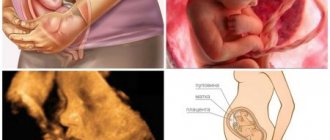Pregnancy is a time of pleasant and painful anticipation of the birth of a little person. But, unfortunately, quite often carrying a child is accompanied by problems during pregnancy. Conventionally, all difficulties that arise during an interesting situation can be divided into psychological and physiological. In this article we will look at what problems a woman faces during the 9 months of pregnancy.
Psychological assistance for pregnant women
The emotions that the expectant mother experiences during pregnancy change physiological indicators: breathing rate, heart rate, blood biochemical composition - thus, even at the physical level, the mother’s reaction to pregnancy and her emotions have a powerful effect on the child’s body.
Send a request for a consultation with a psychologist
Complete confidentiality
Professionalism
Individual analysis of non-standard situations
Choosing a consultation location
All information about consultations with a psychologist can be found by clicking on the link.
Each woman reacts differently to pregnancy, and each type of reaction has its own specific risks and their consequences during the upcoming birth and postpartum period. When can we assume the likelihood of developing psychological problems during pregnancy in order to seek psychological support in advance: after all, it is known that it is easier to prevent a problem than to get rid of it.
Polyhydramnios (large volume of amniotic fluid)
Pregnancy Problems
➤ Polyhydramnios is the opposite of oligohydramnios, which means there is excess amniotic fluid. This occurs in less than a percentage of all pregnancies.
While some believe that polyhydramnios is a cause of preterm labor due to uterine distension, a similar predictor is a large amount of amniotic fluid. Rather, it may indicate whether the pregnancy will end or not.
Polyhydramnios is more common when:
- There is multiple pregnancy;
- There is maternal diabetes;
- There is a congenital malformation or certain birth defects;
While some practitioners try to drain the fluid from the uterus through a needle, this is often not a long-term solution as the fluid replaces itself. This may mean that not much is done during pregnancy to address the problem. Because polyhydramnios can increase the risk of something like umbilical cord prolapse, when the water breaks during labor, you will be monitored once labor begins.
Normal psychological reaction
Normal or healthy reaction to pregnancy: this is the best option, which has the following distinctive features:
- A woman is happy about her pregnancy, this is a welcome and long-awaited event
- Treats her pregnancy calmly, without unnecessary anxiety
- She continues to live an active life, the necessary changes in lifestyle and restrictions are perceived as not burdensome and are carried out easily - pregnancy fully corresponds to her life plans
- Registers with the antenatal clinic on time, promptly follows all doctors’ recommendations, and attends prenatal training classes.
- Signs of attention from others to her “position” are perceived calmly, but do not require special attention to themselves
- Good relationships with parents and close relatives who are happy about her pregnancy and support her
- Harmonious and warm relationship with her husband: the pregnancy is planned and desired for both. The husband is not jealous of his wife's unborn child
- She happily tries to imagine her unborn child and tries to understand his emotions by his movements.
- The woman believes that she can cope with her maternal responsibilities and is initially determined to breastfeed; she treats the unborn baby responsibly and with love.
The psychologist can only be happy for this expectant mother, the child and the family as a whole: there is a great chance that this family will raise a healthy and harmonious child. Psychological consultation in such cases may be needed only to once again make sure that everything is in order and the pregnancy is proceeding according to plan.
New articles on the site
Indifferent attitude towards pregnancy and the unborn child
Such women try to “not notice” their pregnancy themselves and react rather painfully when others pay attention to it. Signs of indifferent perception:
- A woman is upset when she finds out she is pregnant
- She gets irritated when people around her try to show attention, inquire about her health, or try to give up her seat on public transport.
- She tries not to think about her pregnancy and does not experience positive emotions about it
- A woman does not think about the birth ahead, or about motherhood in general.
- Tries to ignore symptoms of pregnancy; in later stages, they experience irritation about changes in figure and weight gain
- If the expectant mother is under 20 years old, such an attitude towards pregnancy is explained by general psychological immaturity at this age. For her, a child is more of an obstacle to freedom and life plans.
- Older women who do not want to change their usual, established lifestyle. They have neither the time nor the desire to register, undergo the necessary examinations and attend training classes
- An unregistered marriage, a man’s reaction does not interest her; he is often simply not informed, however, like parents and other close people - considering that the event is not particularly important.
- The woman tries not to notice the child, does not track his movements, does not try to imagine him
- Waiting for childbirth as an opportunity to get rid of the burden and continue a “normal” life
Online consultation: ask a psychologist a question
Headaches/back pain
As the body undergoes hormonal changes, most pregnant women complain of migraines, frequent headaches and back pain . Pain is felt in the lower back and pelvis - it is usually experienced by pregnant women during the first trimester, as the ligaments stretch and become softer, which causes back tension. After childbirth, the discomfort goes away.
Risks for the child as indications for psychotherapy
In cases of indifference or rejection of one’s pregnancy, the child, even before his birth, becomes a potential client of a child psychologist and more. It has been revealed that such children suffer from hyperactivity syndrome at an early age, and in adolescence they may have a tendency to antisocial protest behavior, possibly the use of psychotropic drugs. They are often diagnosed with neuropsychiatric diseases.
Based on the interests of the child, family, and society as a whole, such a woman is certainly indicated for psychotherapy to help her solve the following problems:
- Improve your relationship with your husband, help the couple get closer
- Help you think about and understand the system of life priorities, where a child cannot be in last place
- To help realize your responsibility to the future little man, to feel his complete dependence on his mother’s attitude
- Help a woman feel warmth and sympathy for her child
Euphoric perception of pregnancy
From the moment the fact of pregnancy is established, a woman experiences an exaggeratedly wonderful mood, which differs from a normal good mood in the absence of an adequate perception of reality. No matter what happens, everything is fine with such a woman, which may not always correspond to reality.
Signs of euphoria:
- Hysterical personality type, prone to mood swings - emotions from dissatisfaction to delight
- Pregnancy is desired, but for one or another mercantile reasons
- From the moment pregnancy is established, she demands special attention from everyone: from family members to doctors, she insists on fulfilling all her whims
- When turning to doctors, he requires the best specialists, at a level not lower than a professor.
- Uses her pregnancy to manipulate loved ones
- She often shows dissatisfaction when those around her, as it seems to her, are not “impressed” enough with her “outstanding” position
- Manifestations of emotions towards the unborn child are clearly exaggerated and hypertrophied: excessive delight, excessive fantasies, excessive love
- She believes that she will be the best mother and the child will be simply outstanding: the smartest, most beautiful, talented and brilliant
Physiological problems
The constantly growing belly and the continuous changes occurring in the body of the expectant mother naturally affect her health. Almost all women carrying a child face one or another problem during pregnancy. Next, we will look at the most common unpleasant satellites of an interesting position, and how to reduce their manifestation.
Phlebeurysm
It appears due to changes that occur in the body during pregnancy: hormonal levels change, the amount of circulating blood increases, the tone of the venous wall decreases, and the pelvic veins are compressed by the growing uterus. Varicose veins can appear in the pelvis, anus (hemorrhoids), labia and legs. To prevent varicose veins, it is recommended to take a knee-elbow position for 1-2 minutes 6-8 times a day, do not wear constrictive clothing, do not cross your legs when sitting and do not put one leg on top of the other. Varicose veins can become a real problem during late pregnancy, as in severe cases it leads to redness, burning sensation and pain.
Headache
Appears due to an increase in the volume of blood circulating in the body and due to an increase in the level of the hormone progesterone. This condition is usually a problem during late pregnancy. Since it is prohibited to take any medications without permission while carrying a child, to reduce pain, wash your face with cool water, do self-massage of the neck-collar area and scalp. If the headaches are unbearably severe, a pregnant woman should consult a doctor so that he can prescribe her painkillers approved for use by pregnant women.
Dizziness
This condition is caused by a decrease in blood glucose levels due to hunger, a decrease in blood pressure, a sudden change in body position, prolonged standing or lying on the back, and being in a stuffy room. To prevent dizziness, try to eat small and often, and do not allow a strong feeling of hunger to develop. If your health deteriorates in a stuffy room, try to leave it as soon as possible to prevent loss of consciousness, another problem of early pregnancy.
Swelling of the arms and/or legs
May indicate kidney problems during pregnancy. The appearance of such symptoms must be immediately reported to the gynecologist so that he can prescribe an examination and can identify the pathology in a timely manner. If the doctor does not detect problems with the kidneys, then the cause of swelling may be difficulty in venous outflow or excessive pressure of the uterus on the inferior vena cava. In these cases, the expectant mother needs to limit fluid intake after 18 hours, not walk or stand for more than 20 minutes at a time, not wear tight clothes, and do gymnastics for pregnant women.
Nasal congestion
Nasal congestion and difficulty breathing are a common problem in late pregnancy. Difficulty in breathing develops due to the fact that the growing uterus presses, and this leads to displacement of the diaphragm. Also, after 28 weeks of bearing a child, under the influence of hormones, many women experience an increase in blood supply to the capillaries of the mucous membrane of the respiratory tract, which causes swelling of the mucous membrane and narrowing of the lumens of the bronchi, larynx, and nasal passages.
Risks of a euphoric attitude towards pregnancy and the need for psychological support
- If any problems or difficulties arise during pregnancy or childbirth, the woman is completely unprepared for them, is unable to cooperate with doctors, due to her pretentiousness, capriciousness and irresponsibility, or quickly falls into panic
- The born child causes disappointment in the mother: he is completely far from the ideal that she imagined for herself.
- Subsequently, when raising a child, such a mother strives for hyperprotection, depriving the child of all initiative and limiting independence. The mother actively resists his growing up, raising an infantile personality. This parenting model can also cause the husband’s disagreement and lead to conflict situations.
Choose an ecotherapy program
Premature birth
Pregnancy problems
➤ Premature birth is a very serious complication of pregnancy. Early detection can help prevent premature birth, possibly allowing you to carry your pregnancy to term or give your baby a better chance of survival. There are many causes of preterm birth, including infections, uterine problems, multiple births, and maternal illnesses. No matter what causes preterm labor, it's important to know what the signs are so you can get emergency help.
You should call your doctor or midwife if you have any of the following signs of preterm labor:
- Contractions or spasms;
- Bright red bleeding;
- swelling or puffiness of the face or hands;
- Pain during urination;
- Acute or prolonged abdominal pain;
- Acute or persistent vomiting;
- A sudden flow of clear, watery fluid;
- Lumbago;
- Intense pelvic pressure;
There may be other signs that your doctor tells you to look for; Be sure to call if you are concerned. If you can't get hold of your doctor, you can go to the emergency room for help.
Signs of the beginning formation of increased anxiety and fear:
- Ambivalent attitude towards pregnancy: joy combined with fears
- A woman is embarrassed about her pregnancy
- The first movement of the fetus causes negative emotions - questions arise: is everything okay?
- Constantly bad premonitions and doubts about the favorable outcome of pregnancy and childbirth, anticipation of unpleasant events without any reason or predisposing factors
- He is very suspicious of the words of medical personnel, interpreting them exclusively in a negative way
- The psyche is very easily traumatized, which makes it difficult for medical personnel and even a perinatal psychologist to work with such a patient
Such women may be contraindicated in group classes to prepare for childbirth - their own anxieties, combined with the anxieties and worries of other pregnant women in the group, conversations about complications are tried on themselves and can induce the emergence of fears. For women of an anxious type, individual consultations and sessions with a perinatal psychologist are required. Psychotherapy for fear of pregnant women is a complex task that requires work and serious effort to solve it.










